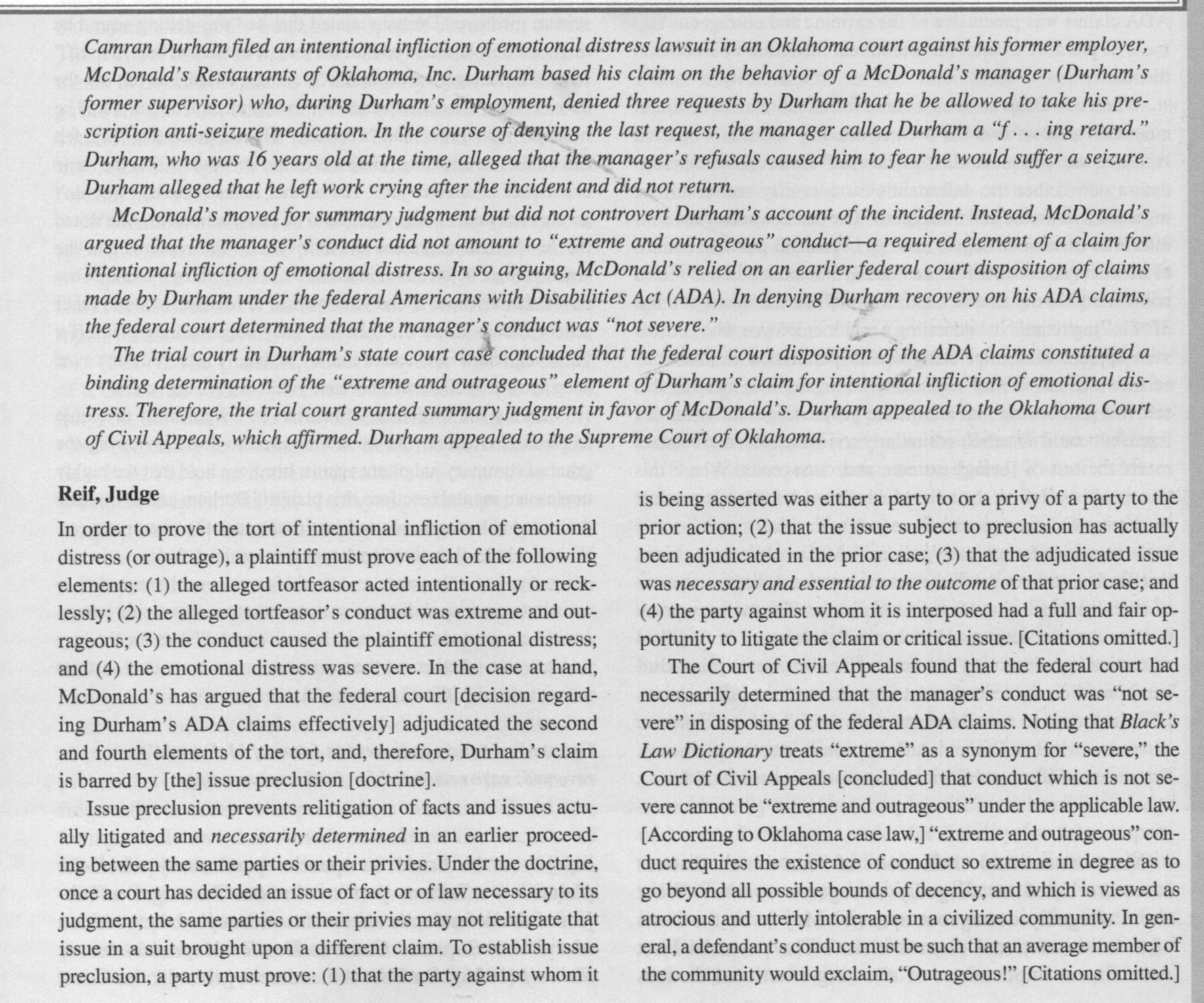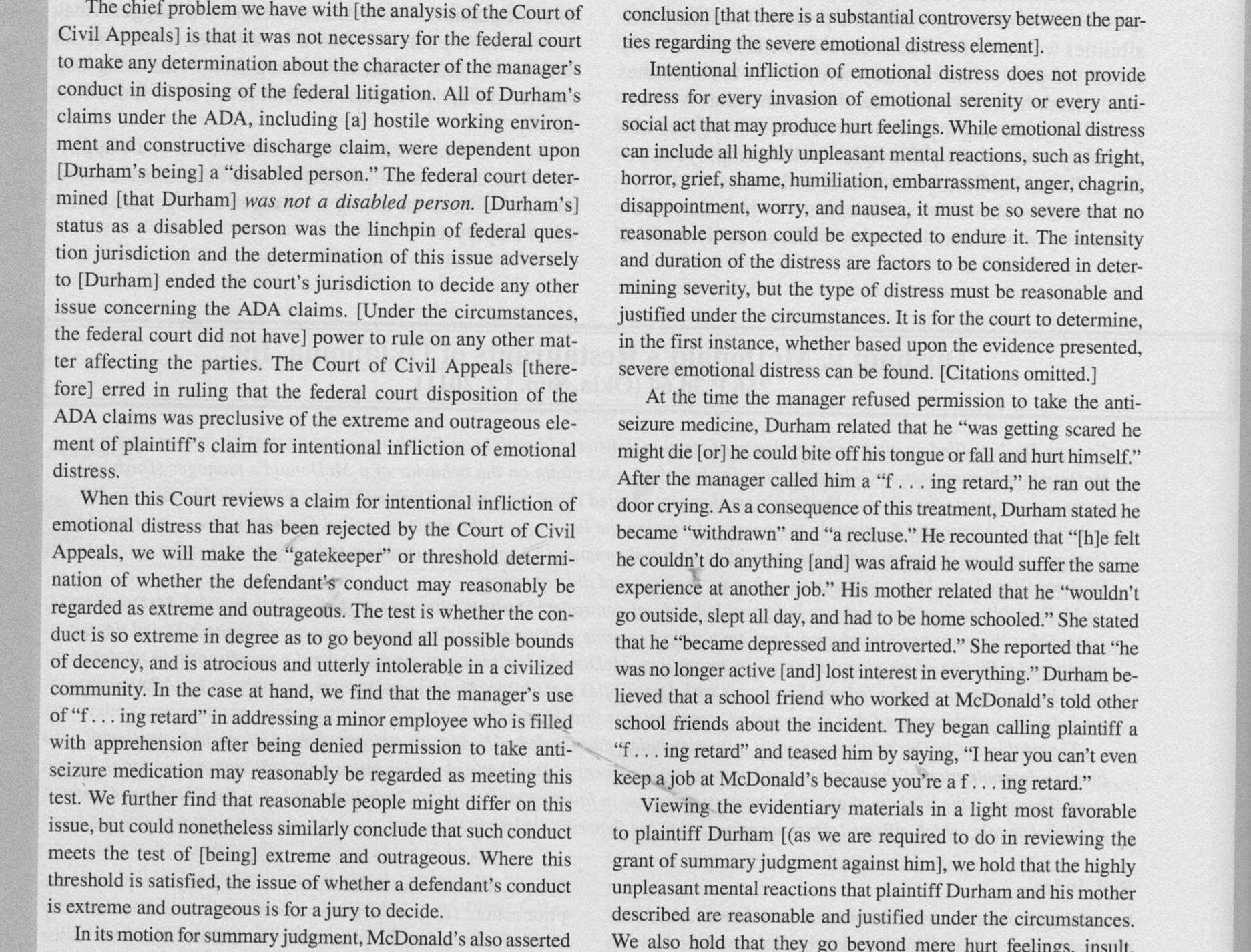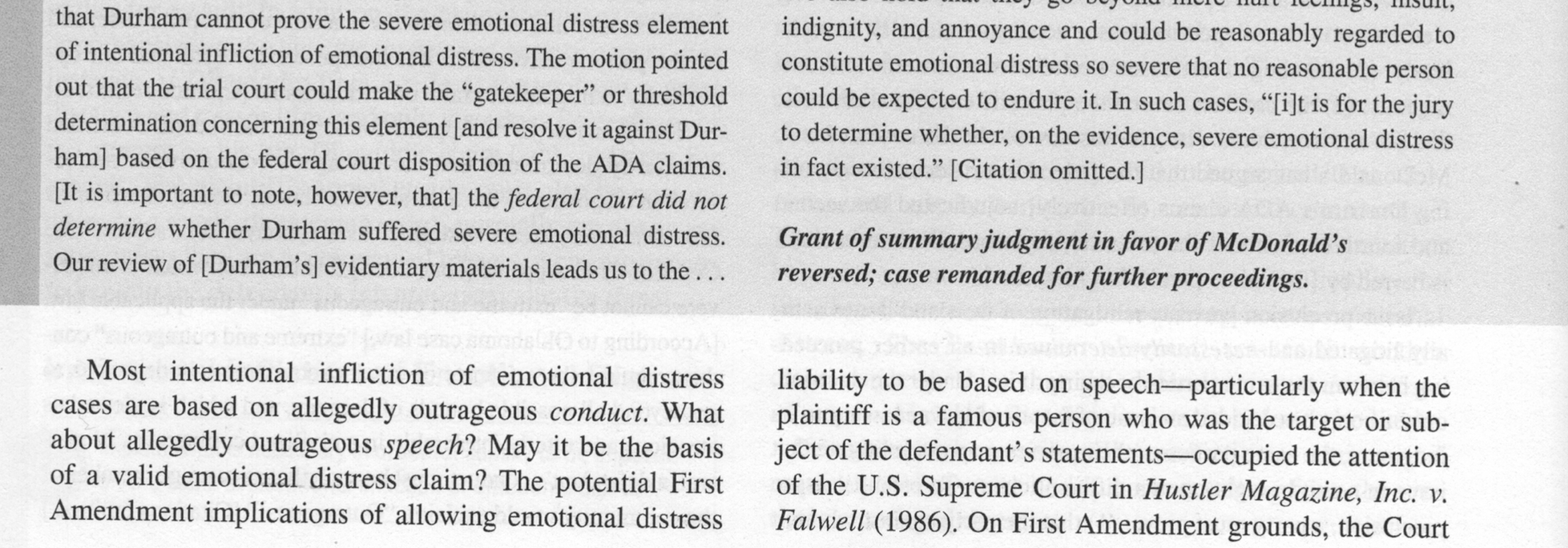


This is the case of Brief: Durham v. McDonald's Restaurant of Oklahoma Inc.
Question: please summarize and include
the following;
Fact:
Judgment:
Legal Principle:
Reasoning:
General Analysis
Legal Principle:
Issue:
Holding:
Applied Analysis:
Camran Durham filed an intentional infliction of emotional distress lawsuit in an Oklahoma court against his former employer, Mcdonald's Restaurants of Oklahoma, Inc. Durham based his claim on the behavior of a Mcdonald's manager (Durham's former supervisor) who, during Durham's employment, denied three requests by Durham that he be allowed to take his pre- scription anti-seizure medication. In the course of denying the last request, the manager called Durham a "f . . . ing retard." Durham, who was 16 years old at the time, alleged that the manager's refusals caused him to fear he would suffer a seizure. Durham alleged that he left work crying after the incident and did not return. Mcdonald's moved for summary judgment but did not controvert Durham's account of the incident. Instead, Mcdonald's argued that the manager's conduct did not amount to "extreme and outrageous" conduct-a required element of a claim for intentional infliction of emotional distress. In so arguing, Mcdonald's relied on an earlier federal court disposition of claims made by Durham under the federal Americans with Disabilities Act (ADA). In denying Durham recovery on his ADA claims, the federal court determined that the manager's conduct was "not severe." The trial court in Durham's state court case concluded that the federal court disposition of the ADA claims constituted a binding determination of the "extreme and outrageous" element of Durham's claim for intentional infliction of emotional dis- tress. Therefore, the trial court granted summary judgment in favor of Mcdonald's. Durham appealed to the Oklahoma Court of Civil Appeals, which affirmed. Durham appealed to the Supreme Court of Oklahoma. Reif, Judge is being asserted was either a party to or a privy of a party to the In order to prove the tort of intentional infliction of emotional prior action; (2) that the issue subject to preclusion has actually distress (or outrage), a plaintiff must prove each of the following been adjudicated in the prior case; (3) that the adjudicated issue elements: (1) the alleged tortfeasor acted intentionally or reck- was necessary and essential to the outcome of that prior case; and lessly; (2) the alleged tortfeasor's conduct was extreme and out- (4) the party against whom it is interposed had a full and fair op- rageous; (3) the conduct caused the plaintiff emotional distress; portunity to litigate the claim or critical issue. [Citations omitted. ] and (4) the emotional distress was severe. In the case at hand, The Court of Civil Appeals found that the federal court had Mcdonald's has argued that the federal court [decision regard- necessarily determined that the manager's conduct was "not se- ing Durham's ADA claims effectively] adjudicated the second vere" in disposing of the federal ADA claims. Noting that Black's and fourth elements of the tort, and, therefore, Durham's claim Law Dictionary treats "extreme" as a synonym for "severe," the is barred by [the] issue preclusion [doctrine]. Court of Civil Appeals [concluded] that conduct which is not se- Issue preclusion prevents relitigation of facts and issues actu- vere cannot be "extreme and outrageous" under the applicable law. ally litigated and necessarily determined in an earlier proceed- [According to Oklahoma case law,] "extreme and outrageous" con- ing between the same parties or their privies. Under the doctrine, duct requires the existence of conduct so extreme in degree as to once a court has decided an issue of fact or of law necessary to its go beyond all possible bounds of decency, and which is viewed as judgment, the same parties or their privies may not relitigate that atrocious and utterly intolerable in a civilized community. In gen- issue in a suit brought upon a different claim. To establish issue eral, a defendant's conduct must be such that an average member of preclusion, a party must prove: (1) that the party against whom it the community would exclaim, "Outrageous!" [Citations omitted.]The chief problem we have with [the analysis of the Court of conclusion [that there is a substantial controversy between the par- Civil Appeals] is that it was not necessary for the federal court ties regarding the severe emotional distress element]. to make any determination about the character of the manager's Intentional infliction of emotional distress does not provide conduct in disposing of the federal litigation. All of Durham's redress for every invasion of emotional serenity or every anti- claims under the ADA, including [a] hostile working environ- social act that may produce hurt feelings. While emotional distress ment and constructive discharge claim, were dependent upon can include all highly unpleasant mental reactions, such as fright, [Durham's being] a "disabled person." The federal court deter- horror, grief, shame, humiliation, embarrassment, anger, chagrin, mined [that Durham] was not a disabled person. [Durham's] disappointment, worry, and nausea, it must be so severe that no status as a disabled person was the linchpin of federal ques- reasonable person could be expected to endure it. The intensity tion jurisdiction and the determination of this issue adversely and duration of the distress are factors to be considered in deter- to [Durham] ended the court's jurisdiction to decide any other mining severity, but the type of distress must be reasonable and issue concerning the ADA claims. [Under the circumstances, justified under the circumstances. It is for the court to determine, the federal court did not have] power to rule on any other mat- in the first instance, whether based upon the evidence presented, ter affecting the parties. The Court of Civil Appeals [there- severe emotional distress can be found. [Citations omitted.] fore] erred in ruling that the federal court disposition of the At the time the manager refused permission to take the anti- ADA claims was preclusive of the extreme and outrageous ele- seizure medicine, Durham related that he "was getting scared he ment of plaintiff's claim for intentional infliction of emotional might die [or] he could bite off his tongue or fall and hurt himself." distress. After the manager called him a "f . . . ing retard," he ran out the When this Court reviews a claim for intentional infliction of door crying. As a consequence of this treatment, Durham stated he emotional distress that has been rejected by the Court of Civil became "withdrawn" and "a recluse." He recounted that "[he felt Appeals, we will make the "gatekeeper" or threshold determi he couldn't do anything [and] was afraid he would suffer the same nation of whether the defendant's conduct may reasonably be experience at another job." His mother related that he "wouldn't regarded as extreme and outrageous. The test is whether the con- go outside, slept all day, and had to be home schooled." She stated duct is so extreme in degree as to go beyond all possible bounds that he "became depressed and introverted." She reported that "he of decency, and is atrocious and utterly intolerable in a civilized was no longer active [and] lost interest in everything." Durham be- community. In the case at hand, we find that the manager's use lieved that a school friend who worked at Mcdonald's told other of "f . . . ing retard" in addressing a minor employee who is filled school friends about the incident. They began calling plaintiff a with apprehension after being denied permission to take anti- "f . . . ing retard" and teased him by saying, "I hear you can't even seizure medication may reasonably be regarded as meeting this keep a job at Mcdonald's because you're a f . . . ing retard." test. We further find that reasonable people might differ on this Viewing the evidentiary materials in a light most favorable issue, but could nonetheless similarly conclude that such conduct to plaintiff Durham [(as we are required to do in reviewing the meets the test of [being] extreme and outrageous. Where this grant of summary judgment against him], we hold that the highly threshold is satisfied, the issue of whether a defendant's conduct unpleasant mental reactions that plaintiff Durham and his mother is extreme and outrageous is for a jury to decide. described are reasonable and justified under the circumstances. In its motion for summary judgment, Mcdonald's also asserted We also hold that they go beyond mere hurt feelings.that Durham cannot prove the severe emotional distress element of intentional iniction of emotional distress. The motion pointed out that the trial court could make the "gatekceper'.' or threshold determination concerning this element [and resolve it against Dur- ham] based on the federal court disposition of the ADA claims. [It is important to note, however, that] the federal caurrdid not determine whether Durham suffered severe emotional distress. Our review of [Dmham's] evidentiary materials leads us to the . . . Most intentional iniction of emotional distress cases are based on allegedly outrageous conduct. What about allegedly outrageous speech? May it be the basis of a valid emotional, distress claim? The potential First Amendment implications of allowing emotional distress , vi- ___- w. ._..l, 9.. -VJV... my. aunt inhuman, mun, indignity, and annoyance and could be reasonably regarded to constitute emotionalvdistness so severe that no reasonable person could be expected to endure it. In such cases, \"[i}t is for the jury to determine whether, on the evidence, severe emotional distress in fact existed.\" [Citation omitted] Grant of summary judgment in favor ochDonaId's reversed; case remandedformlrer proceedings. liability to be based on speechparticularly when the plaintiff is a famous person who was the target or sub- ject of the defendant's statementsoccupied the attention of the US. Supreme Court in Hustler Magazine, Inc. v. Falwell (1986). On First Amendment grounds, the Court












